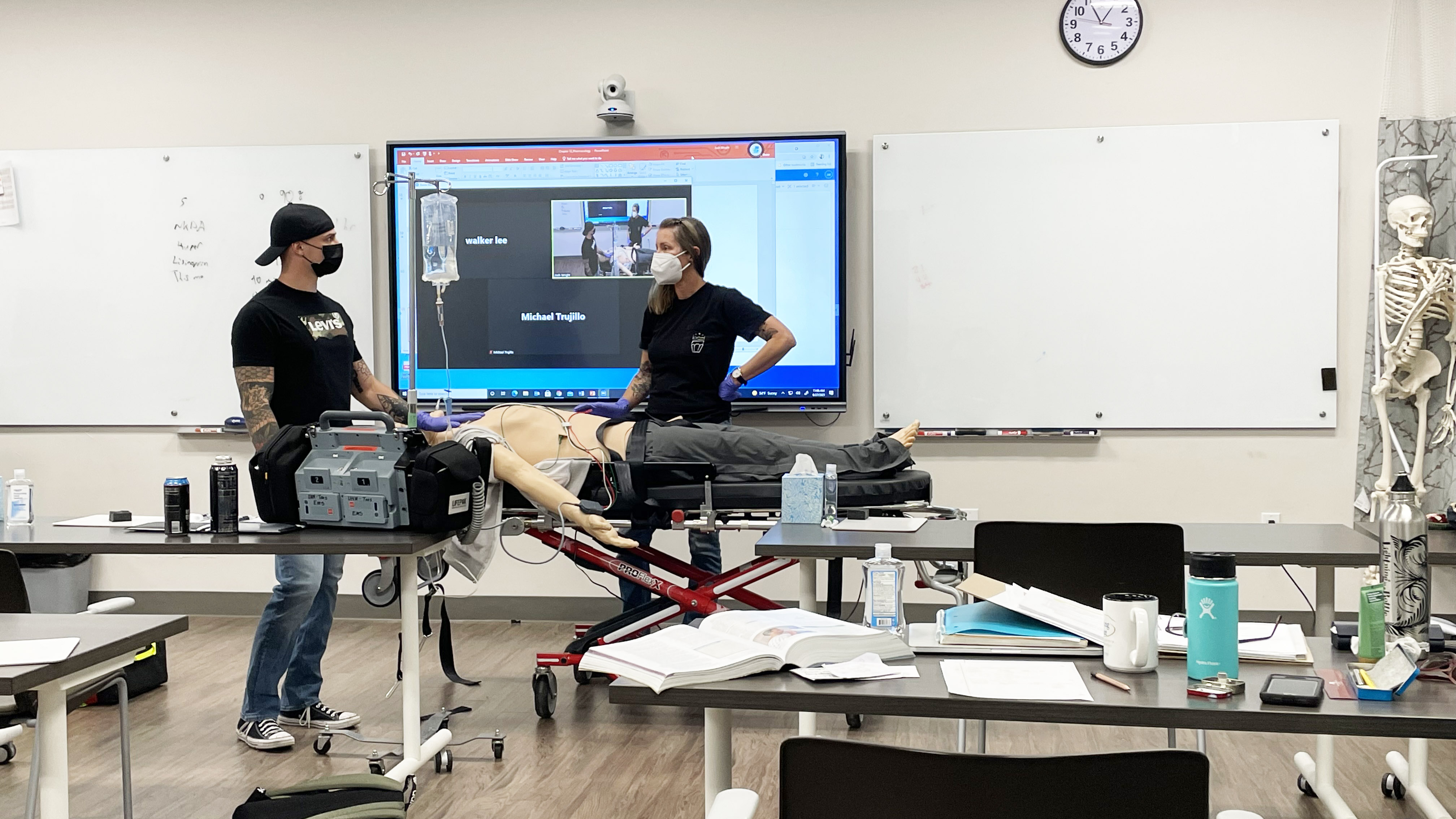Program will train 48 students to respond to overdoses, opioid use disorder
September 13, 2022

Photo by Josh Wright
“Originally, I didn’t want to be an EMT, but I took the course and fell in love with it,” said UNM-Taos EMT first-responder/basic training grad and Dixon resident Gilbert “Gilly” Valdez. “When people call us, they’re having one of their worst days, so our work is important as the first people they see. Ultimately, having more first responders increases the safety of our entire community.” Pictured is training during a UNM-Taos EMT course.
The University of New Mexico-Taos and Río Arriba County have received $190,000 to train 48 new EMT first-responders to effectively respond to drug overdoses and other scenarios related to opioid use disorder across rural Northern New Mexico.
The competitive Rural EMS Training Grants were awarded by the Substance Abuse and Mental Health Services Administration (SAMHSA) of the U.S. Department of Health and Human Services to counties disproportionately affected by opioid use disorder and aims to increase the number of emergency first responders in Río Arriba County. The Higher Education Department considers the program a strong example of how public-public partnerships can be leveraged between colleges, universities, and public service providers.
“I applaud the University of New Mexico-Taos, Río Arriba County, and all community partners involved in this innovative program for bringing additional resources to Northern New Mexico to support critical workforce and meet healthcare needs in rural communities like Española, Dixon, and Taos. Programs like this help ensure that caring and qualified responders are always available to help New Mexicans in need,” Gov. Michelle Lujan Grisham said.
“As the community’s college, the University of New Mexico-Taos has a tight focus on workforce needs in north central New Mexico and we are committed to providing essential workforce training with a focus on connecting local residents with preparation for in-demand careers,” said UNM-Taos Chancellor Dr. Mary Gutierrez. “New Mexico needs trained first responders and health care professionals to ensure that New Mexicans have equitable access to quality community and health resources.”
Dixon resident Gilbert “Gilly” Valdez completed his EMT-first responder and EMT-basic training at UNM-Taos earlier this year and is now pursuing a bachelor’s degree through the Emergency Medical Services Academy at the University of New Mexico’s main campus. After attaining his paramedic license, Valdez is considering pursuing a medical degree to become an emergency room doctor.
“Originally, I didn’t want to be an EMT, but I took the course and fell in love with it,” Valdez said. “When people call us, they’re having one of their worst days, so our work is important as the first people they see. Ultimately, having more first responders increases the safety of our entire community.”
In addition to standard emergency response training, students will gain the skills to respond to situations involving opioid use disorder and overdose. Río Arriba County ranks among the highest nationwide for opioid-related deaths with 30 to 40 residents dying each year from drug-related causes. The program will combine emergency medical training with behavioral health and harm reduction strategies taught by licensed professionals.
“We hope to increase the access of all New Mexicans living in rural north central New Mexico to timely and competent emergency medical services in their communities. And importantly, we strive to provide a pathway for young people in our region to pursue careers in public safety and healthcare,” said University of New Mexico-Taos EMS Instructor and District Chief of the Dixon Volunteer Fire Department Dr. Steven Jenison. Jenison is leading the project in partnership with Río Arriba County, The Mountain Center, and Serna Solutions LLC.
“One of the really important impacts of this is establishing a pipeline into healthcare for Río Arriba students and to train EMTs with the skills they need to respond to an overdose or behavioral health crisis and de-escalate the situation,” said Río Arriba County Director of Health and Human Services Lauren Reichelt.
Three 12-week courses will be offered at various volunteer fire departments across the county for current volunteer firefighters and any interested participant 16 or older. The courses will be offered in the fall, spring, and summer with the first course starting September 20, 2022. Those completing the program will meet the requirements to sit for the National Registry Exam to obtain a New Mexico license to practice as an emergency medical professional.
In addition to improving community well-being, the program will support the growing healthcare workforce, which currently accounts for a quarter of wages in Río Arriba County.
Those interested in registering for the Rural EMS training course should contact Dr. Steven Jenison at dixonnmvfd@gmail.com or 505.692.4673. Information will also be posted when available at the UNM-Taos EMS Program website here.
